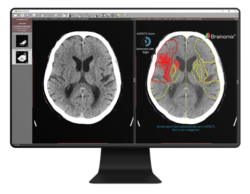 The Oxford AHSN is working with the five Integrated Stroke Delivery Networks in South East England and the NHS regional team to roll out and evaluate brain imaging incorporating artificial intelligence (AI) at 33 acute stroke sites. Harnessing state-of-the-art technology in this way has led to rapid access to treatment with mechanical thrombectomy (MT) and improved outcomes for stroke patients including prevention of long-term disability. Increasing access to thrombectomy is a priority outlined in the NHS Long Term Plan.
The Oxford AHSN is working with the five Integrated Stroke Delivery Networks in South East England and the NHS regional team to roll out and evaluate brain imaging incorporating artificial intelligence (AI) at 33 acute stroke sites. Harnessing state-of-the-art technology in this way has led to rapid access to treatment with mechanical thrombectomy (MT) and improved outcomes for stroke patients including prevention of long-term disability. Increasing access to thrombectomy is a priority outlined in the NHS Long Term Plan.
In a national first, high quality CT brain scans are being shared quickly and securely within and between hospitals using imaging software which incorporates AI. As well as supporting clinical decision-making, the new system is also helping to overcome disruption caused by Covid-19.
Initially introduced in the Oxford AHSN region through the Thrombectomy Innovation and Transformation Network (TITAN), the approach has been adopted by four more stroke networks across the South East.
Previously, CT brain scans had to be reviewed by a specialist in limited locations. Now they can be seen within a few minutes of being processed – anywhere, any time – and advice given immediately. Reducing the time between the patient arriving in hospital and being referred for treatment is crucial in securing full recovery after having a stroke.
The rapid transfer of high-quality images enables a more coordinated and swift response in identifying whether a patient would benefit from MT, a procedure to remove a blockage in a large blood vessel in the brain which can cause a severe stroke.
Within the Thames Valley, Oxford University Hospitals NHS Foundation Trust (OUH) provides specialist stroke care for patients requiring MT. In 2022, 223 MTs were carried out in Oxford. Across the Thames Valley it is estimated that 300-400 patients per year could benefit from MT.
The innovative e-Stroke Suite technology developed by Brainomix, an Oxford-based company spun out of the University of Oxford, helps clinicians to rapidly and accurately decide the type and severity of stroke and the most appropriate treatment. It has demonstrated added benefits by enabling new ways of working in a world disrupted by the pandemic. For example, if one hospital is overburdened with Covid-19 another within the regional network can help out by interpreting brain scans without delay. The Oxford AHSN is carrying out a detailed evaluation of the e-Stroke Suite as part of the Brainomix AI in Health and Care Award. Read our initial findings (September 2022)

